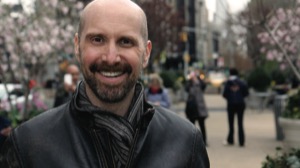
When I figured out that other people were figuring out I was gay, or maybe gay, or maybe just weird, say around the age of 14, I became hyper-vigilant about how I might be perceived by, well, everyone who was close enough to perceive me. Most of it was in my clothes (carefully disheveled instead of carefully dapper), my proclaimed interests (basketball not Bronski Beat), and my physical gestures (unlimp that wrist). When I heard my voice recorded on an answering machine, I was a little bit horrified. The long, dramatic “Hellohhhhh” and the Valley Girl inflection of “Call me?” I wasn’t even trying to be funny. Yes, there was some internalized homophobia, but I was more concerned about detection, about what would happen in my high school social circle if they correctly determined that I was gay. (It happened, and some of them behaved wretchedly.)
Do I Sound Gay? is the title of David Thorpe’s insightful and excellent documentary about whether there is a gay “voice.” Thorpe begins the film on a troubling down note; he says he has always hated the sound of his voice and wants to do what he can to change it, to make it sound less gay and more manly. I actually felt sick to my stomach as he practiced the masculine intonations assigned by a voice coach. It reminded me so much of the horrible scene in The Birdcage in which Armand (Robin Williams) viciously berates the feminine walk, talk and mannerisms of Albert (Nathan Lane). As the audience I watched the film with roared with laughter, I cried, traumatized by the self-hate and cruelty.
But as Thorpe delves into the sound of his voice, and whether it signified gayness to others or only to himself, the film becomes less about shame and more of an investigation. Thorpe asks his family and friends what they heard and what they thought about his voice or mannerisms – not much, especially compared to how much Thorpe himself thought about them – but he also talks to linguistic researchers, his friends and various celebrities. While many gay men do make certain phonetic sounds that are similar and are possibly influenced by female role models during childhood, the bigger issue is not those sounds but how people react to them.
David Sedaris talks about how he was sent to a speech pathologist along with the other “future homosexuals of America.” There was nothing wrong with his speech at all except for some elongated s’s and a’s that didn’t sound sufficiently “masculine.” Others talked about being bullied and shamed simply because of the tone of their voice. That said, some of Thorpe’s friends seemed downright angry that he’s even delving into the issue because there’s nothing wrong with how any of us talk.
As an anthropologist, I thought Thorpe missed opportunities to delve more deeply into the gay slang that out gay people learn and use to identify each other, to speak in code and to express themselves. I code-switch all of the time, speaking with different words in a different timbre in gay and straight situations, and Thorpe barely touches on this important gay adapation and survival method. This is when that so-called gay voice gets transformed from a possibly secret shame into something bonding and empowering, from “Oh, Mary!” to “Yasssss!” Thorpe’s ultimate argument, that an assertive voice trumps any kind of affected vowel, is a worthy one, but I was less interested in his journey to acceptance than I am in our community’s and thus our subculture’s resilience.
Do I Sound Gay?
Directed by David Thorpe
Featuring David Thorpe, Tim Gunn and Jeff Hiller
Opens at Landmark Ken on July 24
also playing
Ant-Man
Too much has been made about Ant-Man being a film about one of the minor Marvel superheroes. But Ant-Man turned out to be a damn fine film, much more enjoyable and coherent than the massively hyped Avengers: Age of Ultron. Paul Rudd plays Scott Lang, a thief with a heart of gold and an engineering degree, who is recruited by brilliant and aging scientist Dr. Hank Pym (Michael Douglas) to don the shrinking Ant-Man suit and stop the evil Darren Cross (Corey Stoll) from using the shrinking formula as a military weapon. The action is fun and light, mostly because it involves being tiny and riding ants like a cowboy, and the dialogue is delightful, especially as delivered by Rudd, one of our most likable comic actors (who has beefed up nicely for the role).











